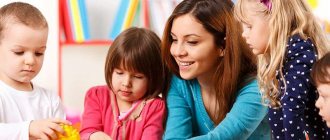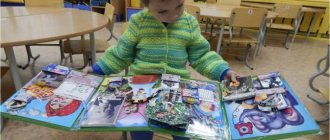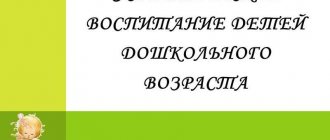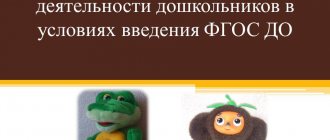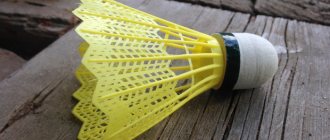Patriotic education of preschool children according to the Federal State Educational Standard of Education
Galina Lapteva
Patriotic education of preschool children according to the Federal State Educational Standard of Education
One of the components of the educational areas “Social and communicative development”
of the Federal State Educational Standard for Education is the patriotic education of preschool children , positive socialization of preschool , familiarization of children with sociocultural norms, traditions of the family, society and state. Patriotism is love for the Motherland, devotion to one’s Fatherland, the desire to serve its interests and readiness, even to the point of self-sacrifice, to defend it.
The goal of patriotic education is the development in Russian society of high social activity, civic responsibility, spirituality, the formation of citizens with positive values and qualities, capable of demonstrating them in the creative process in the interests of the fatherland, strengthening the state, ensuring its vital interests and sustainable development.
Patriotism is a moral and political principle, a social feeling, the content of which is love for the fatherland and the willingness to sacrifice one’s private interests for the benefit of the interests of the fatherland. Patriotism presupposes pride in the achievements and culture of one’s homeland, the desire to preserve its character and cultural characteristics and self-identification (a special emotional experience of one’s belonging to the country and one’s citizenship, language, traditions) with other members of the people, the desire to protect the interests of the homeland and one’s people. Love for your homeland, country, people, attachment to your place of birth, to your place of residence.
The tasks of patriotic education of preschoolers are :
— historical continuity of generations, preservation, dissemination and development of national culture, fostering a careful attitude towards the historical and cultural heritage of the peoples of Russia;
- education of Russian patriots , citizens of a legal, democratic state, capable of socialization in a civil society, respecting the rights and freedoms of the individual, possessing high morality and showing national and religious tolerance, respect for the languages, traditions and culture of other peoples;
- nurturing in a child love and affection for his family, home, kindergarten, street, city;
-showing friendly attention to others, the desire to provide help and support to another person;
- careful attitude towards the surrounding nature, the results of other people’s work, other people’s and one’s own things.
-formation of basic knowledge about human rights;
— introducing children to the symbols of the state (coat of arms, flag, anthem)
;
developing a sense of responsibility and pride for the country’s achievements;
Patriotism is a moral feeling. It is formed gradually in the process of accumulating knowledge and ideas about the environment, and will grow out of love for loved ones and native land. Patriotic feeling , feeling of the Motherland... It begins with the attitude towards the closest people - mother, father, grandfather, grandmother, brother, sister. The child discovers his homeland in the family. This is his immediate environment, where he draws concepts such as “labor”
,
"debt"
,
"Motherland"
.
The development of love and affection for one’s home is the first stage of civic-patriotic education of preschool children .
What should be kept in mind when instilling in a child the first sense of citizenship? How to reveal to him the content of such a complex and multifaceted concept as “home”
?It includes:
- attitude towards oneself as an individual;
- the family where the child was born and raised, the atmosphere of the home, which is largely determined by family traditions and native culture;
- the house in which he lives;
- home street.
Gradually the concept of “home”
is expanding.
The second stage is already your hometown, your native land. The third stage is only a small one (the native land, but also a large, multinational Motherland - Russia, of which the child is a citizen, planet Earth is our common home. The child receives his first ideas about his native country in kindergarten, including information about nature, folk culture, life of people of different nationalities. Any region or region is unique, each has its own nature, people, but no matter how special the region is, it is part of the big beautiful country of Russia. In the process of patriotic education , respect for the symbols of the country, pride in belonging to one’s country and its people, a positive and caring attitude towards people’s work and nature is formed.
Love for the Motherland becomes a real feeling when it is expressed in the desire and need to work for the good of the Fatherland, therefore it is necessary to encourage the child’s activities, which are based on the desire to do something for others children, relatives, for kindergarten, city.
education are also solved .
Preschool educational institutions use a variety of methods and forms of work, taking into account the age-related worldview of children ;
— excursions and targeted walks (laying flowers at the monument to N. F. Vatutin)
;
mini-museum “Russian Izba”
);
- teacher's ;
- conversations about your hometown, country, its history;
- monitoring changes in the appearance of your hometown;
- the work of people in kindergarten and in the city, village;
— display of illustrations, films, slides;
Listening to audio recordings (national anthem, patriotic songs about the Motherland )
;
- use of folklore works (proverbs, sayings, Russian folk games, fairy tales, songs, nursery rhymes, chants);
– introduction to Russian folk arts and crafts (painting, toys, embroidery)
;
— acquaintance with the work of poets, artists, composers);
-organization of thematic exhibitions;
— participation in public and national calendar holidays;
- reading competition;
- participation of children in feasible socially useful work.
Patriotic education is an integral part of the general educational process and is a systematic and purposeful activity, instilling in children a sense of pride, deep respect and veneration for the symbols of the Russian Federation - the Coat of Arms, Flag, Anthem, other Russian symbols and historical shrines of the Fatherland;
Patriotism needs to be cultivated from early childhood. Currently, many ways and methods are proposed, but we must not forget that patriotism is formed individually in each child. It is connected with the spiritual world of a person, his personal experiences. And the task of teachers and parents is to make these experiences vivid and unforgettable. When starting work on patriotic education , the teacher himself must know the natural, cultural, social, and economic features of the region where he lives. He must think about what to tell the children about, especially highlighting what is characteristic only of a given area, and clearly show the connection between his hometown or village and the whole country. And most importantly, it is necessary that the teacher loves the Motherland, his land, the city and always remembers the words of Academician D.S. Likhachev: “The feeling of love for the Motherland must be carefully cultivated, instilling spiritual settledness, since without roots in a small area, a person is like dried tumbleweed plant."
Patriotic education should be carried out in close cooperation with parents:
— questioning; consultations (information)
for parents;
-parent meetings;
— round table discussions;
— visual information in the locker room; participation of parents in excursions and craft competitions; at laying flowers, etc.
Success in patriotic education can only be achieved by those teachers who can achieve interaction with children “from the heart”
, to be sincere and deeply convinced not only of the correctness of their positions, but also to believe in the healing power, to realize the spiritual wealth of their people.
Teachers who can captivate their students with their thoughts and feelings, and inspire them with their ideals and beliefs.
Passion for one's profession, professional skills, pedagogical literacy, active life position, high patriotic qualities and feelings - this is the set that a real teacher should have.
Ceremonial events dedicated to public holidays
Activities for patriotic education in preschool educational institutions are usually timed to coincide with the celebration of relevant public holidays, such as Victory Day, Defender of the Fatherland Day, International Women's Day.
When preparing for the event, children learn the history of the holiday, understand who it is dedicated to and why it is celebrated.
For example, when preparing for the Victory Day celebration, you can hold a “Dove of Peace” campaign, making white paper doves with your children as symbols of peaceful life. For the event itself, learn military songs (“Katyusha”, “Victory Day”, etc.), poems on relevant topics. You can organize a meeting with veterans or children of war as part of the project “Such different childhoods: war and peace.”
In preparation for the celebration of Defender of the Fatherland Day, boys develop the concept that they are future men, strong and strong, the support of their family, the Motherland, its defenders. On the holiday itself, you can hold several different events depending on the age of the children, for example, a holiday congratulating fathers with military-themed poems, songs and dances, sports competitions, a lesson-conversation “We need peace,” dedicated to the army that protects our country.
International Women's Day is dedicated to the formation in preschoolers of family values and the image of a mother, a woman as a guardian of the family. Traditionally, events on this day are dedicated to congratulating mothers and grandmothers. The day before, children make gifts for them with their own hands, developing their creative abilities.
Expanding the theme of the small homeland
Every corner of our Motherland is unique and original in its own way. It is important to introduce the child to the beauty of the nature of his native land, to its traditions and way of life.
One of the ways is to organize a mini-museum of local history in a preschool educational institution. In it you can collect a collection of antique things that characterize everyday life, samples of folk art products (embroidery, napkins, tablecloths, amulets, dishes, toys).
Another method of exploring your native land is to conduct excursions and visit attractions.
Educational lessons are also held. Appropriate topics on patriotic education are selected for classes. Children will learn about their famous fellow countrymen, the history of the emergence and development of their native settlement, the natural features of the region, and study folklore.
Systematic work carried out in preschool educational institutions allows preschoolers to instill primary knowledge of the history, geography of their native land, its features of development and formation.
National holidays
In order for children to perceive themselves as part of their people, they must be imbued with its foundations and understand its originality. To do this, preschool educational institutions organize conversations and classes to familiarize themselves with folk life, but children best learn information while playing. You can celebrate national holidays with songs, dances, and a good mood to join the traditions.
Celebrations begin with Christmas and the old New Year. Children learn carols, then visit in groups, sing, and receive sweets as a reward.
The Maslenitsa celebration can be organized during a walk; all preschool children can participate in it at the same time. Winter, Spring, and buffoons take part in the performance. Preschoolers get acquainted with the history of the holiday, its essence and symbols. The main symbol of Maslenitsa is pancakes; you can involve parents in making them and organize a kind of fair.
The Easter holiday also has its own symbols. A lesson on painting Easter eggs is being held. There are a lot of methods and techniques that give a child the opportunity to develop their artistic abilities.
